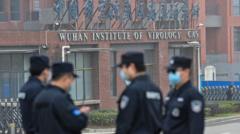In a revealing development reported by two German newspapers, Germany's foreign intelligence service, the Bundesnachrichtendienst (BND), believed there was an 80-90% chance that the coronavirus originated from an accidental leak at a Chinese laboratory. This assessment, conducted in 2020, was part of an operation dubbed Project Saaremaa, suggesting that the Wuhan Institute of Virology was involved in experiments that modified viruses to become more transmissible to humans.
Despite repeated denials from China, which asserts that the origin of the virus should be a scientific question, the lab-leak hypothesis has regained traction within intelligence circles. This comes as agencies such as the U.S. CIA have also indicated that a lab-related incident is more plausible than a natural origin based on the evidence available. Chinese authorities continue to emphasize that investigations have deemed the lab-leak theory as "extremely unlikely," citing the results of a joint study conducted with the World Health Organization (WHO).
The BND's findings reportedly showcased indications of safety protocol violations occurring at the Wuhan lab, though no definitive proof of a lab leak was available. Meanwhile, these revelations were never made public until now and were shared with the CIA in autumn 2022.
The WHO investigation in early 2021—with scientists visiting Wuhan and the associated lab—concluded that the lab-leak theory was improbable. Nevertheless, discrepancies in findings have led various scientists to criticize the completeness of the investigation, giving rise to further speculation about the virus’s true origins.
While the theory of a natural spillover from bats to humans was initially favored, the absence of a matching virus in the wildlife population has led some to reconsider its plausibility. As this debate continues to unfold, the implications for global health protocols and relations with China remain significant.
Despite repeated denials from China, which asserts that the origin of the virus should be a scientific question, the lab-leak hypothesis has regained traction within intelligence circles. This comes as agencies such as the U.S. CIA have also indicated that a lab-related incident is more plausible than a natural origin based on the evidence available. Chinese authorities continue to emphasize that investigations have deemed the lab-leak theory as "extremely unlikely," citing the results of a joint study conducted with the World Health Organization (WHO).
The BND's findings reportedly showcased indications of safety protocol violations occurring at the Wuhan lab, though no definitive proof of a lab leak was available. Meanwhile, these revelations were never made public until now and were shared with the CIA in autumn 2022.
The WHO investigation in early 2021—with scientists visiting Wuhan and the associated lab—concluded that the lab-leak theory was improbable. Nevertheless, discrepancies in findings have led various scientists to criticize the completeness of the investigation, giving rise to further speculation about the virus’s true origins.
While the theory of a natural spillover from bats to humans was initially favored, the absence of a matching virus in the wildlife population has led some to reconsider its plausibility. As this debate continues to unfold, the implications for global health protocols and relations with China remain significant.


















